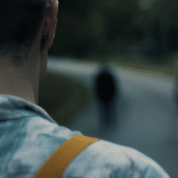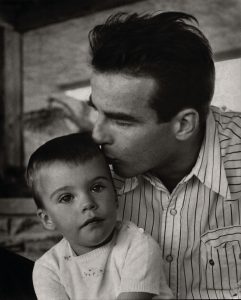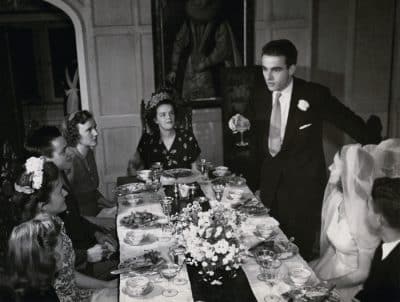Dir: Marco Berger | Drama 126′
Marco Berger has made ten films since Plan B in 2009 and is building up a recognisable style involving gay related themes involving cautious tales of uncertain sexuality, brushes with toxic masculinity and a male gaze clearly focused on young adult men.
A number of these films including Hawaii, Taekwondo, The Blonde One, Young Hunter 2020 and Horseplay 2023 introduce dark disturbing undertones into inconclusive situations from which this latest outing will take a warm and softer tone without losing the director’s questioning view of male relationships.
The Astronaut Lovers explores the relationship of two close friends who had first met as boys and again through a chance meeting years later, on a summer vacation with a group of friends. The first sighting of Maxi ( (Lautaro Bettoni) by Pedro (Javier Oran) becomes an almost iris eye image of voyeuristic beauty and the catalyst for a reunion filled with sexual and emotional possibilities.
The problem is that Maxi is straight and has an ex-girlfriend who suspects he is bisexual and has proposed that she will only take him back as long as he has a sexual liaison with his childhood friend. Pedro, who is gay, becomes uncertain as to Maxi’s interest in him which creates the moral compass at the heart of the film.
Berger’s intelligent rapport with actors involves fascinating verbal patterns out of conversations and the way people talk. Although the film may be a trifle over-long and contains unusually explicit and horny dialogue, this builds up the affectionate relationship between the two men. References to astronauts in space venturing into uncharted territory involves more comic sexual innuendo than in Berger’s previous films.
Wide screen camerawork by Mariano De Rosa captures the landscape of a seaside coastline during a summer vacation, and Berger’s eye for masculine beauty adds layers to the central relationship. This gradually builds up a myriad puzzle of possible games being played out by characters as one man learns the hard way as to how honest and genuine another will feel about him.
The Astronaut Lovers recalls the four-season moral tales of Eric Rohmer films and this may be the precedent as to the new road Berger is taking. The film has a finale with a rewarding surprise and as the filmmaker considers this his favourite film, it may well pave the way for new pathways involving the director’s ideas and feelings about life and gay cinema. PeterHerbert
SCREENED DURING BFI FLARE 2025




 Co-directing and narrating this eye-opening documentary, Robert Clift (who never knew Monty) digs into a treasure trove of family archives and memorabilia (Brooks recorded everything) to reveal an affectionate, fun-loving talent who loved men and dated and lived with women, according to close friends. Monty chose his roles carefully during the ’40s and ’50s, declining to sign a contract to retain complete artistic independence from the studio system with the ability to pick and chose, and re-write his dialogue. This freedom also enabled him to keep much of his private life out of the headlines, although his memory was eventually sullied by tabloid melodrama with his untimely death at only 45. His acting ability and dazzling looks certainly gained him a place in the Hollywood firmament with a select filmography of just 20 features, four of them Oscar-nominated.
Co-directing and narrating this eye-opening documentary, Robert Clift (who never knew Monty) digs into a treasure trove of family archives and memorabilia (Brooks recorded everything) to reveal an affectionate, fun-loving talent who loved men and dated and lived with women, according to close friends. Monty chose his roles carefully during the ’40s and ’50s, declining to sign a contract to retain complete artistic independence from the studio system with the ability to pick and chose, and re-write his dialogue. This freedom also enabled him to keep much of his private life out of the headlines, although his memory was eventually sullied by tabloid melodrama with his untimely death at only 45. His acting ability and dazzling looks certainly gained him a place in the Hollywood firmament with a select filmography of just 20 features, four of them Oscar-nominated. Particularly interesting are Brooks’ conversations with Patricia Bosworth, one of the film’s talking heads and the author of a 1978 biography of Clift that inspired later biographies, but has so far become the accepted version of events, although she apparently got many details wrong and certainly lost out to Jenny Balaban in the Monty relationship stakes, when Barney Balaban (President of Paramount) invited the young actor to join them on a family holiday. He is seen messing around on the beach where he cuts a dash with his good looks and exuberance.
Particularly interesting are Brooks’ conversations with Patricia Bosworth, one of the film’s talking heads and the author of a 1978 biography of Clift that inspired later biographies, but has so far become the accepted version of events, although she apparently got many details wrong and certainly lost out to Jenny Balaban in the Monty relationship stakes, when Barney Balaban (President of Paramount) invited the young actor to join them on a family holiday. He is seen messing around on the beach where he cuts a dash with his good looks and exuberance.